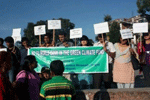Nepal: Activists want the World Bank out from the Green Climate Fund
Published on Wed, 2011-10-19 09:22
The Nepalese Campaign for Climate Justice Network (CCJN) and other groups organized a demonstration on Oct. 12 near the office of the World Bank in Kathmandu against the role of that international financial institution in the Green Climate Fund. The Network is made up by the South Asia Alliance for Poverty Eradication, Rural Reconstruction Nepal (RRN, focal point of Social Watch in that country), All Nepal Peasants’ Federation, General Federation of Nepalese Trade Unions, All Nepal Women Association, National Alliance for Human Rights and Social Justice-Nepal, and Jagaran Nepal. The Green Climate Fund should be established as an operating entity of the United Nations Framework Convention on Climate Change to support projects, programme, policies and other activities in developing countries related to mitigation, adaptation, capacity-building, technology and transfer. A 40 member transitional committee, co-chaired by Mexico, South Africa and Norway, is expected to make way for a Green Climate Board consisting of 24 members evenly divided between developed and developing countries. The World Bank is currently serving as interim trustee, an arrangement that will be reviewed after three years of operation. Countries of the South are the most affected by the adverse effects of climate change, said in the protest on Oct. 12 Dr Sarba Raj Khadka, member of the International Coordination Committee of Jubilee South. United States and other developed countries want the World Bank to have a central role in managing the Green Climate Fund, but the institution does not represent the interests of the countries and communities most adversely impacted by climate change, according to the promoters of the protest. The allocations decided by the World Bank will lead to further indebtedness of countries in the global South, they added. “The World Bank, responsible of increasing vulnerabilities of developing countries, should not be given the right to channel funds from the Green Climate Fund”, said Sarba Raj Khadka, who remarked that the Fund should be managed by United Nations bodies and that the allocations should be decided “by the government of each country, according to their requirements.” The promoters of the demonstration carried signs that read “stop World Bank climate business”, “no to private funds for profit” and “our climate, not your business”. Developing countries are working harder than the rich nations to reduce their carbon emissions, said in June senior scientist Sivan Kartha, of the Stockholm Environment Institute, in the UN conference on climate change convened in Bonn. “There’s a false perception that we need to focus primarily on increasing ambition from emerging economies –these economies have put serious emission cuts on the table. It’s the developed countries that need to actually reduce their emissions, and increase their commitment to provide finance and technology that will allow even greater reductions in developing countries,” the scientist said. “We should not believe that a better quality of life requires consumption and production patterns that destroy the environment,” had said last Friday Roberto Bissio, coordinator of Social Watch, when that network launched the most recent edition of the Basic Capabilities Index (BCI). “The fact remains that there are countries that have lowered their infant mortality to levels similar to those of the US with one tenth of the climate changing gas emissions,” “Between 1990 and 2000, the BCI improved five points (from 79 to 84), while the world per capita emissions of carbon dioxide actually decreased from 4.3 tons to 4.1,” explained Bissio. But in the first decade of the 21st century, world CO2 emissions moved up to 4.6 tons per capita and social indicators only moved up three points. “Although the economic boom of the first decade of the century failed to boost social indicators, it did accelerate environmental destruction”, he summed up. More information This information is based on data from the following sources: » |


